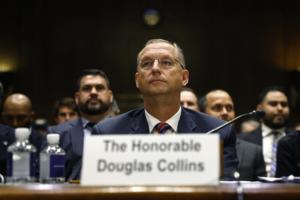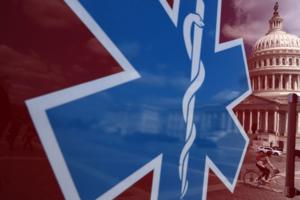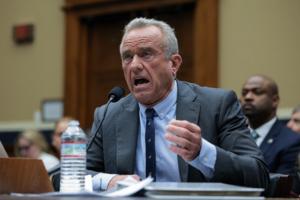Health Advice
/Health
The mother of an LA teen who took his own life is fighting for a new mental health tool for LGBTQ+ youth
LOS ANGELES — Bridget McCarthy believes that if her son Riley Chart had quick and easy access to a suicide prevention hotline designed for queer young people, he might be alive today.
Chart, a trans teen who had once endured bullying because he was different, took his own life at the family's home during the COVID-19 lockdown in September ...Read more

A million veterans gave DNA to aid health research. Scientists worry the data will be wasted
One of the world’s biggest genetic databases comprises DNA data donated over the years by more than a million retired military service members. It’s part of a project run by the Department of Veterans Affairs.
The initiative, dubbed the Million Veteran Program, is a “crown jewel of the country,” said David Shulkin, a physician who ...Read more

In rush to satisfy Trump, GOP delivers blow to health industry
Doctors, hospitals, and health insurers for weeks issued dire warnings to Republican lawmakers that millions of people would lose health coverage and hospitals would close if they cut Medicaid funding to help pay for President Donald Trump’s big tax and spending bill.
But Republicans ignored those pleas, made even deeper cuts, and sent the ...Read more

Vested interests. Influence muscle. At RFK Jr.'s HHS, it's not pharma. It's wellness
On his way to an Ultimate Fighting Championship event, Health and Human Services Secretary Robert F. Kennedy Jr. stopped by the home of podcaster Gary Brecka. The two spent time in a hyperbaric oxygen chamber and tried some intravenous nutrition drips that Brecka, a self-avowed longevity and wellness maven, sells and promotes on his show, “The...Read more

American kids' health is in decline, and they're dying at disproportionate rates, sweeping new study says
PHILADELPHIA — American children today are dying at much higher rates than kids in similar countries. They’re also far more likely to suffer from a chronic disease than children in previous generations were.
That’s according to a new study from researchers at the Children’s Hospital of Philadelphia, who dug through nearly two decades’...Read more

Environmental Nutrition: Cukes are cool!
True to their reputation, cucumbers are pretty cool.
The folklore
A favorite in summer gardens, cucumbers are made up of mostly water, which makes them literally “cool”-ing and hydrating in hot temperatures. They’re also “cool” in the popular sense. Cultivated around the world for more than 3,000 years, cucumbers have gained a ...Read more

Mayo Clinic Q&A: Lifespan vs. healthspan
DEAR MAYO CLINIC: I’ve been hearing a lot lately about healthspan versus lifespan when it comes to aging. What do they each mean? And what is the difference?
ANSWER: We get a lot of questions about what distinguishes between lifespan and healthspan. The simplest answer is to paraphrase a quote from President John F. Kennedy, “It is not ...Read more

Peach vs. nectarine: How do you tell the difference?
Stone fruits are a summer highlight, but sometimes this category of juicy produce can feel a bit muddled. Peaches, nectarines, plums, cherries, and apricots are all in the same family, known for having a pit in the center and a fleshy exterior surrounding it, and just like any relatives, they can often look quite similar. Factor in varieties ...Read more

Less butter, more plant oils, longer life?
Not such good news for butter lovers like myself: Seesawing research on how healthy or unhealthy butter might be received a firm push from a recent Harvard study published in JAMA Internal Medicine. Drawing on decades of data gathered through long-term observational studies, the researchers investigated whether butter and plant oils affect ...Read more

Doulas, once a luxury, are increasingly covered by Medicaid -- even in GOP states
As a postpartum doula, Dawn Oliver does her best work in the middle of the night.
During a typical shift, she shows up at her clients’ home at 10 p.m. She answers questions they may have about basic infant care and keeps an eye out for signs of postpartum depression.
After bedtime, she may feed the baby a bottle or wake the mother to ...Read more

Deadly flesh-eating bacteria in Florida waters: Vibrio cases decline; danger persists
Four people in Florida have died this year from Vibrio vulnificus, a rare flesh-eating bacterium found in warm, brackish seawater, among 11 confirmed cases, according to state health officials.
CBS Miami reports the number is down from 2024, when infections peaked with 82 cases and 19 deaths. Health officials linked that spike to Hurricane ...Read more

Mosquitoes carrying West Nile virus detected in Atlanta: What can you do?
ATLANTA — Two mosquito traps in the Atlanta area recently tested positive for West Nile virus, public health officials said, prompting warnings about the potential health impacts as late summer approaches.
While cases are typically mild and not widespread, the state saw a spike in infections last year, which led to several deaths. The virus ...Read more

Mayo Clinic Q&A: Tips for summer water safety
DEAR MAYO CLINIC: We just moved to an area with a lot of opportunities for water recreation and are so excited about our first summer on the water. But we want to make sure everyone stays safe. Can you give us some pointers for water safety?
ANSWER: Nothing beats a day at the lake, river, beach or pool for fun, fitness, fishing and relaxation. ...Read more

How Trump's Medicaid work requirements could affect mental health care
For many people who have a serious mental illness or are recovering from one, trying to get or keep a job may be overwhelming and exhausting.
Finding out that you need a job in order to keep accessing your mental health care can feel insurmountable.
Yet that may soon be the case for nearly half a million Washington residents.
Under a new rule...Read more

Ask the Pediatrician: How reading can help prevent the summer slide
Summer vacation gives your child a much-needed break from school routines, which is important. But, at the same time, it can also result in what educators call the summer slide or "brain drain" — a learning gap that opens when kids spend long periods away from the classroom.
Not only can reading be a fun leisure activity, it can keep your ...Read more

How to talk to family and friends about a head and neck cancer diagnosis
ROCHESTER, Minn. — Talking to loved ones about a recent head and neck cancer diagnosis can be overwhelming. Of course, there is no one “right” or “wrong” way to handle these conversations — or adjusting to your life with cancer. Everyone has their own pace, preferences and relationship patterns. But taking the time to consider your ...Read more

Insurers fight state laws restricting surprise ambulance bills
Nicole Silva’s 4-year-old daughter was headed to a relative’s house near the southern Colorado town of La Jara when a vehicle T-boned the car she was riding in. A cascade of ambulance rides ensued — a ground ambulance to a local hospital, an air ambulance to Denver, and another ground ambulance to Children’s Hospital Colorado.
Silva’s...Read more

World's premier cancer institute faces crippling cuts and chaos
The Trump administration’s broadsides against scientific research have caused unprecedented upheaval at the National Cancer Institute, the storied federal government research hub that has spearheaded advances against the disease for decades.
NCI, which has long benefited from enthusiastic bipartisan support, now faces an exodus of clinicians...Read more

Missouri abortion ban would also restrict transgender care. It's already illegal
For Celeste Michael, the transgender community is being used as a pawn in Missouri’s push to ban abortion.
When the 23-year-old went to vote in Lee’s Summit last November, signs outside her polling place falsely claimed an abortion rights amendment would legalize transgender surgeries for minors. Nearly 52% of voters approved the measure, ...Read more

How a Supreme Court win for public health bolstered RFK Jr. and threatens no-cost vaccines
WASHINGTON — Public health advocates won a big case in the Supreme Court on the last day of this year's term, but the victory came with an asterisk.
The decision ended one threat to the no-cost preventive services — from cancer and diabetes screenings to statin drugs and vaccines — used by more than 150 million Americans who have health ...Read more
Popular Stories
- American kids' health is in decline, and they're dying at disproportionate rates, sweeping new study says
- Mayo Clinic Q&A: Lifespan vs. healthspan
- World's premier cancer institute faces crippling cuts and chaos
- In rush to satisfy Trump, GOP delivers blow to health industry
- Vested interests. Influence muscle. At RFK Jr.'s HHS, it's not pharma. It's wellness








